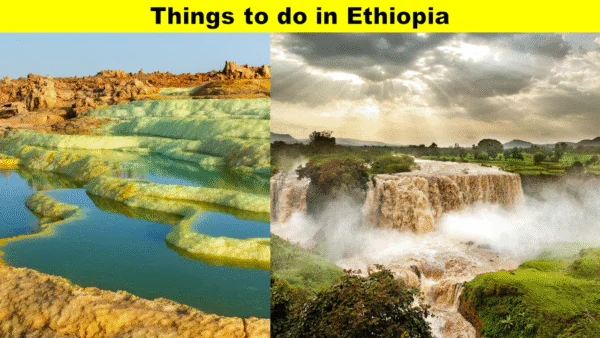Things to do in Ethiopia based on NeemTime research from most popular to just popular.
Rock-Hewn Churches of Lalibela, Ethiopia
Overview: The Rock-Hewn Churches of Lalibela are a UNESCO World Heritage Site featuring eleven medieval monolithic churches carved directly into solid rock, showcasing extraordinary Ethiopian Orthodox architecture and devotion.
History: Commissioned by King Lalibela in the 12th century to create a “New Jerusalem” after Muslim conquests made pilgrimages to the Holy Land dangerous.
Since When: Construction dates back to the late 12th and early 13th centuries.
Review: Visitors are awed by the architectural genius, spiritual atmosphere, and intricate carvings of these underground sanctuaries.
When to Go: Best visited from October to March during Ethiopia’s dry season for easier access and comfortable weather.
How to Go: Accessible by a domestic flight from Addis Ababa to Lalibela Airport followed by a short drive or taxi to the church complex.
What to Do: Explore the interconnected churches, observe religious ceremonies, and learn about Ethiopian Orthodox traditions from local guides.
Free or Paid: Paid entry with ticketed access for foreign visitors.
National Museum of Ethiopia, Ethiopia
Overview: The National Museum of Ethiopia in Addis Ababa houses Ethiopia’s most important archaeological and historical artifacts, including the famous hominid fossil “Lucy.”
History: Established to preserve and exhibit Ethiopia’s rich cultural heritage and prehistoric discoveries.
Since When: Officially opened in 1958.
Review: Visitors praise the museum for its fascinating paleoanthropological exhibits and well-curated displays of ancient art and artifacts.
When to Go: Open year-round, but mornings are best to avoid crowds.
How to Go: Located in central Addis Ababa, easily reachable by taxi, ride-hailing apps, or local transport.
What to Do: View Lucy’s fossil replica, explore ancient artifacts, and learn about Ethiopia’s royal history and traditional art.
Free or Paid: Paid entry with affordable ticket prices.
Simien Mountains National Park, Ethiopia
Overview: Simien Mountains National Park is a UNESCO-listed natural wonder known for dramatic escarpments, deep valleys, and unique wildlife such as the Gelada baboon and Ethiopian wolf.
History: Established to protect Ethiopia’s highland ecosystem and biodiversity.
Since When: Declared a national park in 1969 and a UNESCO World Heritage Site in 1978.
Review: Trekkers and nature lovers rave about the breathtaking scenery, challenging hikes, and rare wildlife sightings.
When to Go: Best from October to March for clear skies and dry trails.
How to Go: Access via a domestic flight to Gondar followed by a 2–3 hour drive to the park entrance.
What to Do: Hike scenic trails, spot endemic wildlife, camp under starry skies, and enjoy panoramic mountain views.
Free or Paid: Paid entry with separate fees for guides and camping.
Unity Park, Ethiopia
Overview: Unity Park is a modern cultural and historical complex within Addis Ababa’s Grand Palace showcasing Ethiopia’s heritage, wildlife, and political history.
History: Developed on the grounds of Emperor Menelik II’s palace to promote national unity and cultural pride.
Since When: Officially opened in October 2019.
Review: Visitors enjoy its beautiful gardens, preserved royal artifacts, and zoo featuring endemic Ethiopian animals.
When to Go: Open year-round, with mornings and weekdays offering the most relaxed experience.
How to Go: Located in central Addis Ababa, accessible by taxi, ride-hailing services, or private car.
What to Do: Tour the palace grounds, view historical exhibitions, stroll through themed gardens, and see native wildlife.
Free or Paid: Paid entry with ticketed access.
Meskel Square, Ethiopia
Overview: Meskel Square is Addis Ababa’s largest public gathering space, renowned for national festivals, political rallies, and cultural celebrations.
History: Named after the Meskel Festival, an annual Ethiopian Orthodox celebration commemorating the finding of the True Cross.
Since When: The square has hosted major events since the mid-20th century.
Review: Travelers appreciate its vibrant atmosphere during festivals and its role as a hub for city life and public events.
When to Go: Best during the Meskel Festival in September for a lively cultural experience.
How to Go: Centrally located and easily accessible by taxi, minibus, or ride-hailing services.
What to Do: Attend festivals, watch parades, take photos, and observe local daily activities.
Free or Paid: Free entry.
Friendship Park, Ethiopia
Overview: Friendship Park is a scenic urban park in Addis Ababa featuring fountains, walking paths, and recreational spaces for relaxation and community gatherings.
History: Built as part of Ethiopia’s urban beautification projects to promote leisure and social interaction.
Since When: Opened to the public in 2019.
Review: Visitors enjoy its clean, well-maintained environment, peaceful ambiance, and modern landscaping.
When to Go: Best in the late afternoon or evening for pleasant weather and illuminated fountains.
How to Go: Located near the city center, accessible by taxi, ride-hailing services, or public transport.
What to Do: Stroll along walking paths, relax by the fountains, enjoy picnics, and take in views of the Addis skyline.
Free or Paid: Free entry.
